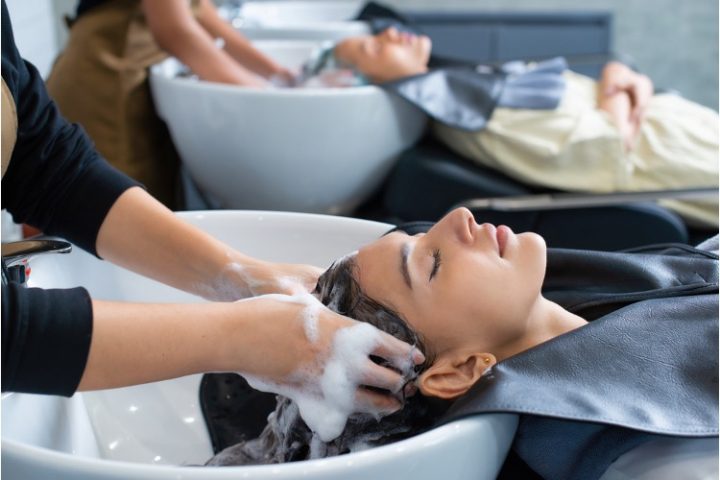
Getting a haircut in New Mexico? Be prepared for a government-sponsored chat with your stylist about Covid-19 and flu vaccines.
Hairstylists in the Land of Enchantment who are taken with the idea of being shills for the Centers for Disease Control and Prevention (CDC) — not to mention collecting the $4,000 stipend that comes with it — can participate in the state’s “Chair Care” program. According to the program’s website:
Chair Care is a program that addresses vaccine hesitancy. Its goal is to increase awareness about COVID-19, long COVID-19 and flu among New Mexicans. Vaccine hesitancy refers to a range of concerns people have about vaccines. Addressing and clarifying those concerns with factual, current information helps protect people from preventable illness.
Crucial partners in this effort are called Trusted Messengers [TMs]: local hair stylists working in privately owned salons. We use culturally appropriate language to reach clients across diverse racial, ethnic and socio-economic populations.
Specifically, the program targets “New Mexico’s Latinx/Hispanic, Black/African American, Native/Tribal and politically conservative populations” because they “have the lowest vaccine uptake and/or highest vaccine hesitancy.”
Chair Care is funded by both the CDC and the New Mexico Department of Public Health, whose vaccine-pushing Better Together New Mexico initiative runs the program along with Presbyterian Community Health. A hair stylist and private salon owner serves as a consultant; the University of New Mexico (UNM) School of Medicine provides a pro-vaccine doctor and program evaluation services; and Albuquerque-based Serna Solutions supplies training in its “non-confrontational, yet challenging,” approach to getting people to change their ways.
“Of course,” notes the Chair Care site, “additional partners include hair stylists as TMs in priority counties who are committed to using their voice to increase COVID-19 and flu vaccination rates in their communities.”
Why use hairstylists rather than, say, doctors to push pro-vaccine propaganda? Citing an Ad Council study, the website explains:
Research tells us that who a message comes from is just as important — if not more — than what the content of the message is. Chair Care TMs play a critical role in sharing the facts about vaccination with their clients because their clients trust them. TMs can talk with their clients about vaccinations in a more relaxed, conversational way than traditional authority figures or healthcare providers sometimes can. (Emphasis in original.)
In other words, observed the Defender, “by training the ‘trusted messengers’ to promote their messages, the public health authorities can get their message across to the public, without the public being aware the message is designed and paid for by those health authorities.”
Stylists who wish to participate in Chair Care must undergo six months of training, during which they will receive the aforementioned stipend. Participants must complete two daylong, in-person training sessions and semimonthly virtual meetings. They are also required to spend 30 to 45 minutes per week submitting (unspecified) data on their client interactions. At the end of the six months, they will put in half a day being debriefed.
Stylists will be trained in “motivational interviewing,” “COVID-19 basics,” “flu basics,” and “long COVID-19 basics,” says the Chair Care page. Since the program is being funded and run by the CDC and other establishment entities, one can be certain that participants will learn nothing but pro-vaccine talking points.
According to the website, Serna Solutions will teach stylists motivational interviewing, defined thus:
Motivational interviewing (MI) is an evidence-based and culturally sensitive approach to helping people manage mixed feelings and move toward healthy behavior change that is consistent with their values and needs. Through the in-person trainings and twice-monthly virtual meetings, TMs will learn how to apply MI techniques in a way that increases interest in behavioral changes associated with better health outcomes, with a specific focus on vaccine hesitancy and vaccine uptake.
In short, stylists will try to guide conversations with their clients in such a way as to make the clients want to get jabbed.
To that end, an August UNM medical school “formative discussion report” on Chair Care suggested that participating stylists be supplied with “[mirror] clings, buttons or stickers that say, ‘Ask me about COVID-19 and hair loss’ [or] ‘Ask me about Chair Care.’” The program might also “provide stylists with pre-made, informative, and engaging content about COVID-19 vaccines that they can post on their social media platforms.” Such content should “prioritize accuracy and respect,” qualities for which the CDC and its fellow travelers are, of course, well-known.
If any of these manages to spark vaccine conversations between stylists and clients, stylists can then offer clients “a range of materials, including pamphlets and QR codes, to cater to different generational preferences,” said the report. After the visit, stylists should “employ subtle methods like anonymous surveys or post-appointment texts to gather feedback from clients about their vaccination status or intent to vaccinate.” Another “subtle” method suggested was “offering incentives like discounts on hair services to clients who show proof of vaccination,” which is also a sure way to lose clients who refuse to be brainwashed.
Chair Care is just the latest in a long line of government vaccine-pushing programs. According to the Defender, “The CDC since 2021 has doled out hundreds of millions of dollars in grants for the creation of ‘culturally tailored’ pro-vaccine materials and for training ‘trusted messengers’ to promote COVID-19 and flu vaccines to communities of color in every state across the country.” Chair Care may prove to be the most hairbrained of them all.



